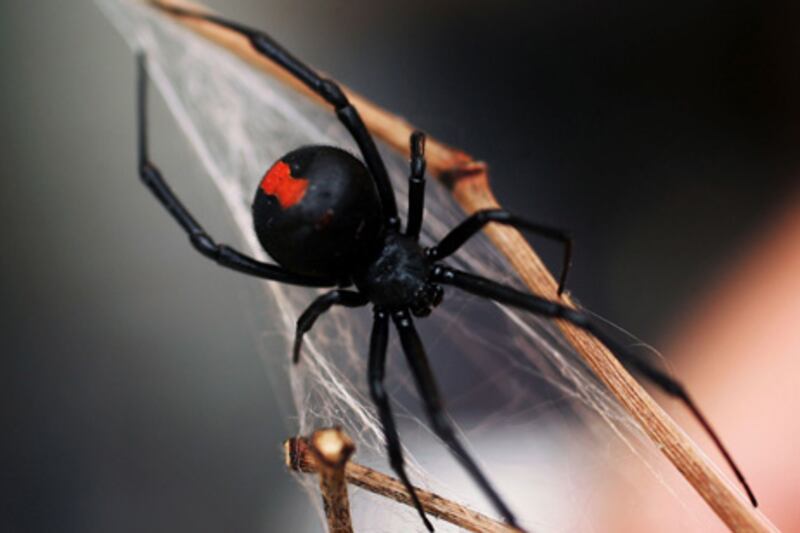DUBAI // It looks like an Australian redback spider and acts like one. But the arachnid that has been spotted in back gardens across the UAE is most likely not the much-feared venomous creature from Down Under.
The spider is instead related to the Antipodean variety, according to two specialists who have been studying the specimens. It is a different species from the same genus, Latrodectus, or widow spiders, they said.
It is not known how much more or less of a threat this species posed to humans, though the venom may be just as toxic.
The latest research appears to dispel the rumours about the redback spiders that have pervaded the Emirates in recent years.
"The Australian one is not the only one with the red back," said Jeremy Miller, a spider expert, or arachnologist, with the Netherlands Centre for Biodiversity Naturalis. "What we have in the UAE is clearly closely related, which probably means that the venom has a similar effect."
But he said it was "not guaranteed". "We don't yet know how dangerous they are to humans compared to redbacks," he said.
The species found in the UAE also has a red stripe running down its back. But it has different DNA and microscopic identifying marks, such as the shape of the stripe, colour pattern underneath, arrangement of the hair and details of the genitalia.
The spider may be indigenous, said Dr Miller, who has identified the species in Iraq and Sri Lanka. Or it may have come from Africa, said Barbara Knoflach-Thaler, a specialist at the University of Innsbruck in Austria.
Classifying the 30-odd species of widow spiders can be difficult because only hazy information exists about all but the best-known members, such as the redback spider and the black widow found in America.
"Latrodectus is unfortunately really notorious for being really difficult to be identified," said Dr Knoflach-Thaler.
The redback scare began more than five years ago, after the spider expert Paul Hillyard, from the Natural History Museum in London, identified them in the UAE on behalf of the Dubai Municipality (he and the municipality declined to comment on the new findings).
Residents from Ras al Khaimah to Abu Dhabi began reporting sightings. Ninety lodged complaints with the pest control section of the Dubai Municipality in a year, and pest control firms hired to eradicate them confirmed the spiders' presence.
However, insect experts and doctors downplayed the danger of the UAE widow spider.
Few, if any, have been reported to have attacked humans, either because they did not get close enough or because they shy away from people, said Antonius van Harten, a research coordinator for the UAE Insect Project, who helped provide samples to the arachnologists abroad.
Only three species of widow spiders - the redback from Australia and others in the US and Europe - were known to show aggression towards humans, he explained.
"In all these years, every time the story comes back about the Australian redback spider, I never hear of anyone getting a bite," he said.
Rashid Hospital in Dubai and the Health Authority - Abu Dhabi (HAAD) said they stocked antivenin for redback spiders, which specialists agreed would work for the widow spider found here.
"It's named different, but it's treated the same," said Yasser Sharif, the head of medication and medical product safety at HAAD. The venom, if comparable with that of redback spiders, as many experts reason it would be, would almost certainly not be fatal but would warrant antivenin, particularly for the young, elderly and hypersensitive.
The venom could cause nausea and vomiting and, possibly, a severe headache, high blood pressure and epileptic seizures, said Dr Ahmed Saleh Abdou, a consultant at Rashid Hospital in infectious diseases and tropical medicines.
As with several other doctors interviewed, he said he and his unit at the hospital had never encountered such a case. "We only know stories from people. I have never been confronted by a patient," he said.
Availability of antivenin
Residents’ fears of the spiders are not helped by confusion over where to turn for help and find antivenin. Authorities acknowledged service is limited. Dubai Municipality Pest Control Section is only attending to complaints in limited situations, said the section official, Motahar Hossain. “But there are 90 private pest control companies available and registered ... and ready to take any complaints.” Confusion remained about where the antivenin was stocked. American Hospital, rumoured to carry it, did not, said Dr Imad Fakhani, the chief of the emergency department. Nor did Dubai, Welcare or City Hospital, all major hospitals in the emirate. In fact, the antivenin is kept in a central storage, available to any hospital requesting it, said Dr Ahmed Saleh Abdou, of Rashid Hospital. In Abu Dhabi, it is available in public hospitals, said Dr Yasser Sharif, of Health Authority – Abu Dhabi.






